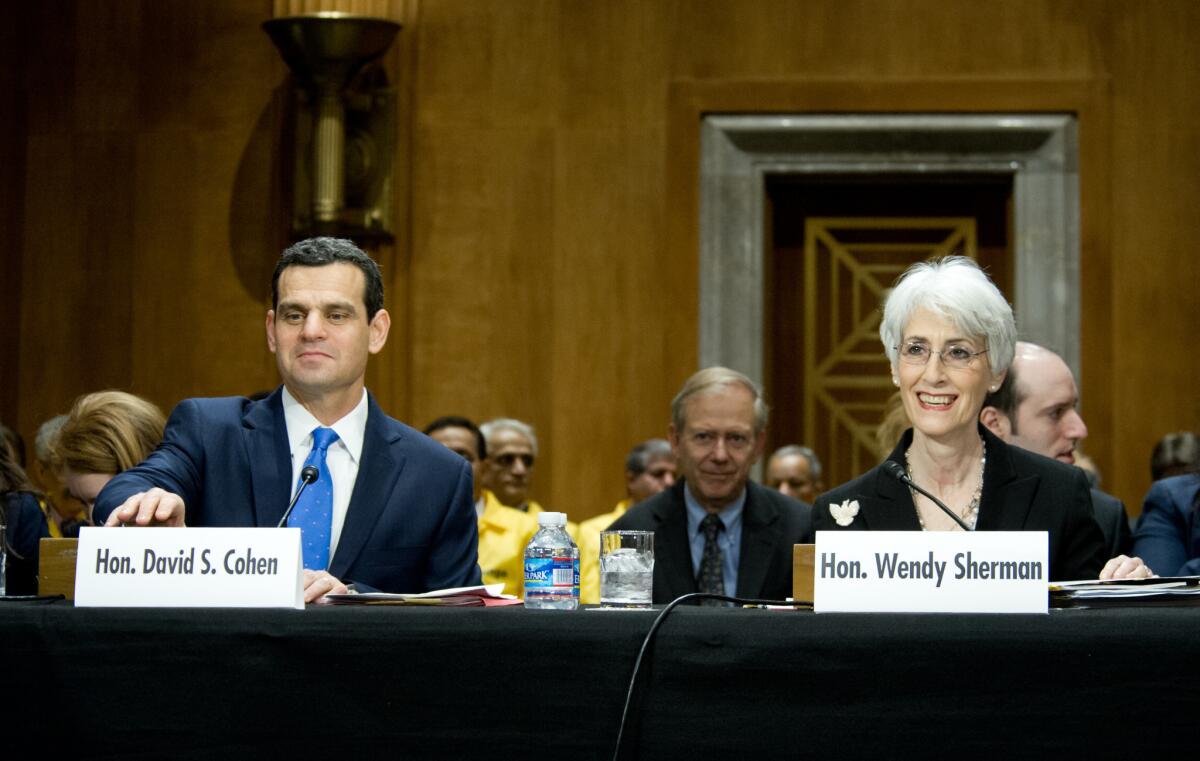Obama administration to tighten pressure on Iran, aide says

WASHINGTON – The Obama administration said Wednesday that it would add more sanctions on Iran in an effort to dissuade Tehran from continuing its nuclear program, but stopped short of backing tough new penalties that lawmakers are considering.
Wendy Sherman, undersecretary of State for political affairs, told the Senate Foreign Relations Committee that the administration would attempt to tighten pressure on Iran in coming months by seeking to further shrink world demand for the country’s oil and make it harder for Tehran to collect foreign currency or precious metals as payment for its petroleum exports.
Sherman said the administration viewed some of Congress’ proposals on Iran favorably, but she did not specifically endorse them. She said further discussion was needed between administration officials and lawmakers.
Washington and its allies have already imposed sanctions on Iran’s nuclear and missile programs, its oil and gas industry, its insurance, banking and financial sectors and other parts of the economy.
The U.S. and other nations believe Iran is seeking to develop nuclear weapons capability. Iran insists its nuclear program is for peaceful uses only.
Sherman warned against taking tough unilateral actions that could alienate U.S. allies that have generally cooperated in the effort to stop Iran from enriching uranium.
Both Congress and the White House support sanctions on Iran, but Obama’s aides have preferred to move more cautiously than many lawmakers, to avoid fracturing the international coalition that is collaborating on the issue or provoking an Iranian reaction that could reduce chances for a diplomatic solution.
“It will be critical that we continue to move together and not take steps that undo the progress made so far,” said Sherman, who was joined by David Cohen, Treasury Department undersecretary for terrorism and financing.
In April, Secretary of State John F. Kerry urged Congress to delay any sanctions until after mid-June, when Iran will hold its presidential election. Officials are concerned that new sanctions could create a campaign issue that would damage diplomatic prospects.
But many lawmakers argue that the long-running diplomatic track is making no progress, and they want to increase pressure quickly.
Congress’ proposals include measures that would make it harder for Iran to access its reserves of foreign currencies and would tighten sanctions until they resemble a near-total trade embargo.
Senators again expressed their frustration over the lack of diplomatic progress.
Sen. Bob Corker (R-Tenn.), ranking minority member of the committee, said he thought it was “highly questionable” that Iran would ever agree to curb its nuclear program.
Sen. Robert Menendez (D-N.J.), the committee chairman, called for tightening sanctions and using more “military pressure” on Iran, without specifying the steps he advocated.
ALSO:
U.S.-Russia ‘reset’ thwarted by Syrian war, spy scandal
International court to explore investigating Israeli flotilla raid
Israeli anger grows over Netanyahu expenses: $1,450 for hair, makeup
More to Read
Sign up for Essential California
The most important California stories and recommendations in your inbox every morning.
You may occasionally receive promotional content from the Los Angeles Times.











